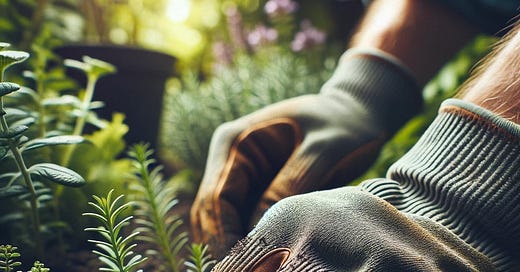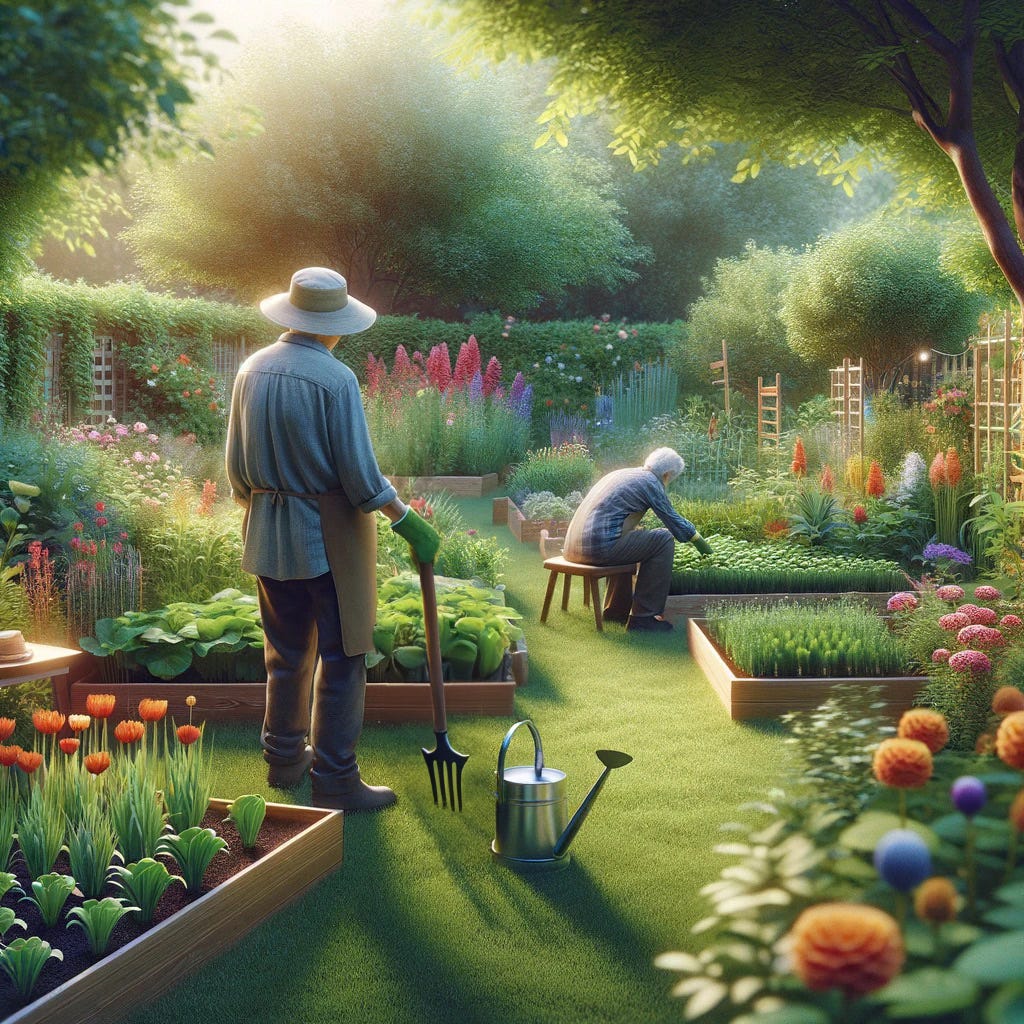NAPA VALLEY, Calif. — Gardening provides lots of benefits to the gardener: great exercise, fresh air and the personal satisfaction of beautifying the landscape. For me, gardening has been a lifelong hobby, but as I age, my body complains about it. I can’t garden for hours as I once did. My back is angry at the end of an hour. I no longer have the strength in my hands that I need for digging or for opening bags.
As a retired occupational therapist, I have learned several tips that I use and recommend to others who want to continue gardening as they age.
First, an ounce of prevention is worth a pound of cure. Some light stretching will keep your body limber, reduce soreness and help you garden longer. Sunscreen and a sun hat are musts. So is staying hydrated when gardening. I keep a bottle of water in my garden bag and take frequent water breaks.
Gloves prevent injury. Buy a good pair of short gloves, then wear them. Long gloves are important if you have thorny bushes, such as roses. Being pricked by thorns may lead to bacterial or fungal infections. Sunglasses not only protect your eyes from the sun but also from thorns and sharp branches. For large pruning jobs, such as fruit trees, protective glasses are a good idea.
Being organized helps conserve your energy. You can reduce the number of trips back and forth to your gardening shed if you first gather all the tools and supplies you need for the project. I keep all of my hand tools in a bright green bag so that if I lose the bag in my garden I can easily find it. It holds my spade, shears, tape and tool sharpener.
Plan your heavy work when you have the most energy, probably in the morning before it gets too hot. Take breaks between tasks. Conserving your energy allows you to garden longer. Keep chairs close to your beds so you can rest, hydrate and admire your garden. An alarm on my cell phone reminds me to take breaks and/or switch tasks. A kitchen timer works, as well.
Repetitive tasks such as pruning roses, weeding or trimming for long stretches can lead to a bad back, tendonitis or sore muscles. Use the timer to switch tasks every so often. If you are sitting, try standing and vice versa. It gives your muscles a stretch. You will be able to garden longer and won’t be as sore later.
Ask for help with tasks such as hauling heavy bags of dirt, shoveling compost or carrying trays of plants. If you don’t have help, use a wagon or wheelbarrow to transport heavy items.
Using lightweight tools instead of heavier metal ones can also help reduce back problems and conserve your energy. Use lightweight leaf bins and fill them only half full before dumping. I use a collapsible garden bag that is lightweight and folds to 3 inches to save on storage space. Lightweight plastic trugs are another option, and they come in a range of sizes.
I hate wrestling with hoses, so a couple of years ago I switched to a lightweight cloth hose. It is easy to maneuver and winds without kinking. Invest in a good one as they can rip.
Ergonomic thumb-controlled sprayers are easy to use and require very little pressure. If you have limited range of motion in your shoulders, consider investing in a long-handled hose wand to extend your reach and avoid straining to access plants.
Bending is hard on our backs. Look for a sturdy no-bend weeder (sometimes called a stand-up weeder) with good reviews.
Sitting while gardening has helped me garden longer. I bought a swivel seat online that fits on top of a 5-gallon bucket. Now I can sit while pruning and place my tools inside. Another popular option is a small foldable padded bench that can be turned over and used as a padded kneeler with handles to help you stand.
Elevated raised beds really minimize bending, and they come in a variety of heights. Place outdoor chairs near them, too, so you can rest and hydrate.
Vertical gardening with hanging baskets or growing plants on fences, walls and trellises eliminates a lot of bending. Container gardening on your patio minimizes the trek from the house if you want to snip some parsley or tarragon for dinner. I love to have fresh herbs close by when cooking.
Arthritis takes a toll on hand strength and flexibility. Choosing large-handled tools can help minimize the strength required. Lightweight aluminum tools might be a good investment. I have used pipe insulation to enlarge the handles of some of mine.
If you have carpal tunnel or wrist problems — or want to avoid them — look for ergonomically designed tools that keep your wrist in a straight line. You want to minimize bending your wrist to decrease pain.
Keeping your tools sharp also helps conserve strength. I keep a sharpener in my garden bag to sharpen my pruners and clippers as I go. With the right tools and tips, we can continue to enjoy gardening into our ripe old age.
Workshop: Join UC Master Gardeners of Napa County for “Home Vineyards: Important Information for a Successful 2024” on Saturday, March 30, from 9 a.m. to 12:30 p.m. Learn the latest about irrigation and treating viruses and mildew. Get up to date on climate change, soil health and structure, increasing soil organic matter and what happens in the vineyard post-pruning. Workshop will be held in a barn at a private home vineyard near Napa. Attendance is free but you must register here to get the address and additional details.
Library Talk: Join UC Master Gardeners and Napa County Library for a talk on “Growing Tomatoes in Small Spaces” on Thursday, April 4, from 7 to 8 p.m. via Zoom. Learn how to grow fabulous tomatoes in containers — on patios, on decks and in other small spaces. Register to receive the Zoom link.
Tomato Plant Sale: UC Master Gardeners of Napa County holds its annual tomato plant sale on Saturday, April 13, from 9 a.m. until sold out, at 1710 Soscol Ave., Napa. Choose from 25 varieties grown by Napa County Master Gardeners. Plants are $5 each, cash or checks only.
Workshop: Join UC Master Gardeners of Napa County for “Growing Tomatoes” on Sunday, April 14, from 2 to 3 p.m., via Zoom. We'll discuss types of tomato plants and how to care for them, including soil and watering needs, staking, pest prevention and more. Register to receive the Zoom link.
Help Desk: The Master Gardener Help Desk is available to answer your garden questions on Mondays and Fridays from 10 a.m. until 1 p.m. at the University of California Cooperative Extension Office, 1710 Soscol Ave., Suite 4, Napa. Or send your questions to mastergardeners@countyofnapa.org. Include your name, address, phone number and a brief description. For best results attach a photo.
If today's story captured your interest, explore these related articles:
Pruning and climate adaptation tips for home vineyards in Napa Valley
Napa’s convergent lady beetles: a Master Gardener’s discovery and insights
Moths and butterflies: Understanding their role and diversity in our gardens
Peggy McConnell is a UC Master Gardener of Napa County.







Thank you for some great tips for aging gardeners. Love them all. It’s just silly to expect to be able to do all we have done for so long. Good tips keep it doable and safe. Greatly appreciated.
Thank you for a great article… being and working in the garden is one of my greatest and fulfilling pleasures🌺